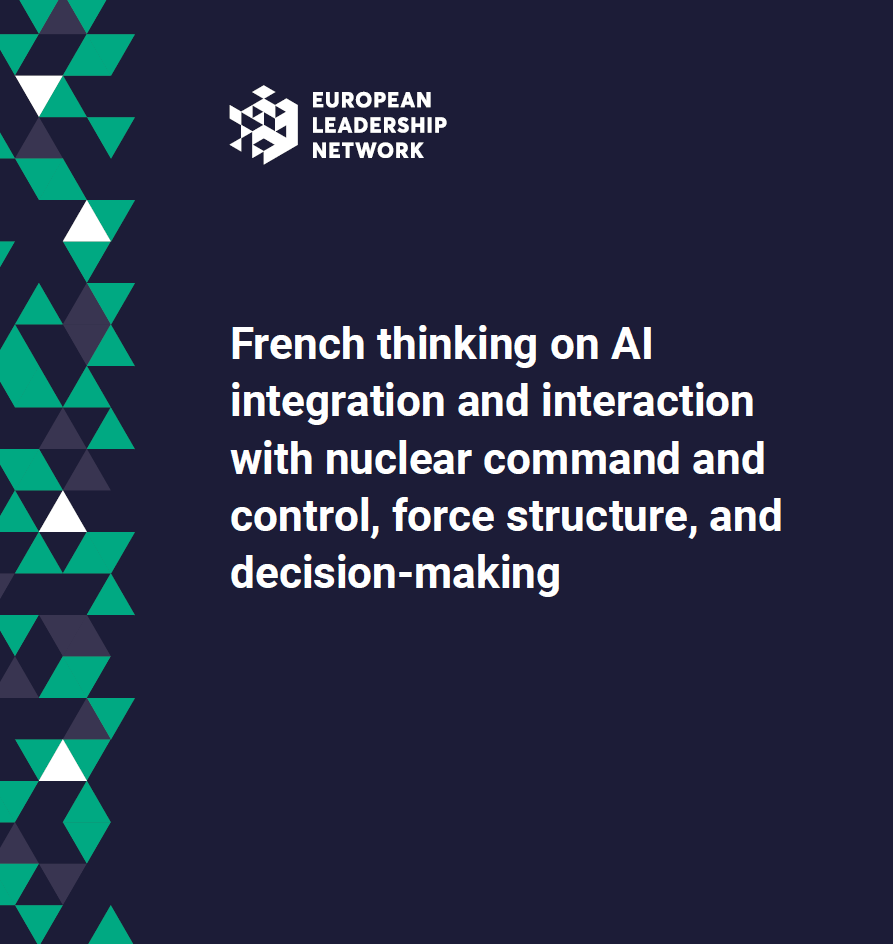French thinking on AI integration and interaction with nuclear command and control, force structure, and decision-making

This paper analyses the French literature on France’s perception of military AI, especially its consequences on strategic systems and competition, and nuclear deterrence.
It draws on official strategies, doctrines, and speeches, reports and studies written by French scholars, and articles written by former or active military officers during their higher military education.
The paper gives a brief overview of the French approach to the debate, followed by the official positions on the development of military AI. It then focuses on the impact of AI on C2 and decision systems, including NC3 and its consequences on strategic stability. It concludes with a short overview of how France understands military AI programs from the P5 countries.
The paper recommends that, both on a domestic and international level, France should:
- Build a stronger community of researchers, officials and the private sector on AI and its impact on nuclear deterrence. Even though some initiatives such as the Réseau Nucléaire & Stratégie aim at creating a new generation of strategists and researchers on nuclear policy and industry, it could be interesting to fund additional scholarships, to create a chair on these topics in academia, or to support a seminar on this subject.
- Strengthen the links between the public and the private sectors. Misunderstanding about AI can fuel wrong analyses about its impact on military and nuclear strategy. Getting together data scientists and computer scientists with IR specialists and nuclear experts could be helpful.
- Support a P5 initiative on AI and risks related to the NC3. The P5 process on Strategic Risk Reduction, including the Youth Group, could be a good arena to push for these topics. A statement about the necessity to keep humans in the loop and to introduce strong means of crisis communication in order to avoid inadvertent escalation could be a good initiative.

Available in:
Regions and themes
Share
Download the full analysis
This page contains only a summary of our work. If you would like to have access to all the information from our research on the subject, you can download the full version in PDF format.
French thinking on AI integration and interaction with nuclear command and control, force structure, and decision-making
Related centers and programs
Discover our other research centers and programsFind out more
Discover all our analysesBundeswehr: From Zeitenwende (historic turning point) to Epochenbruch (epochal shift)
The Zeitenwende (historic turning point) announced by Olaf Scholz on February 27, 2022, is shifting into high gear. Financially supported by the March 2025 reform of Germany’s “debt break” and backed by a broad political and societal consensus to strengthen and modernize the Bundeswehr, Germany's military capabilities are set to rapidly increase over the coming years. Expected to assume a central role in the defense of the European continent in the context of changing transatlantic relations, Berlin’s military-political position on the continent is being radically transformed.
Main Battle Tank: Obsolescence or Renaissance?
Since February 2022, Russian and Ukrainian forces combined have lost more than 5,000 battle tanks, a much higher volume than all the European armor combined. Spearhead of the Soviet doctrine from which the two belligerents came, tanks were deployed in large numbers from the first day and proved to be a prime target for UAVs that became more numerous and efficient over the months. The large number of UAV strike videos against tanks has also led a certain number of observers to conclude, once again, that armor is obsolete on a modern battlefield. This approach must, however, be nuanced by a deeper study of the losses and their origin, UAVs rarely being the sole origin of the loss itself, often caused by a combination of factors such as mines, artillery or other anti-tank weapons.
Mapping the MilTech War: Eight Lessons from Ukraine’s Battlefield
This report maps out the evolution of key technologies that have emerged or developed in the last 4 years of the war in Ukraine. Its goal is to derive the lessons the North Atlantic Treaty Organization (NATO) could learn to strengthen its defensive capabilities and prepare for modern war, which is large-scale and conventional in nature.
"Iron Swords" A Military Analysis of Israel's War in Gaza
On October 7, 2023, Hamas' attack, dubbed “Al-Aqsa Flood,” caused a major shock and led Israel to launch the longest war in its history. Operation “Iron Swords” was notable for its unprecedented intensity, both in terms of the massive ground forces deployed and the firepower used.












